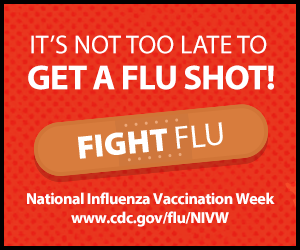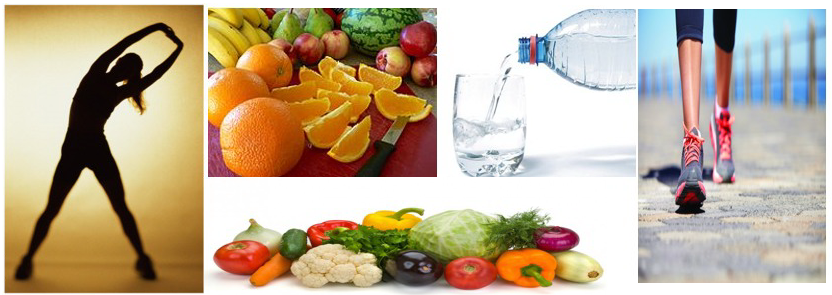NUTRITION CAN HELP KEEP YOU HEALTHY DURING FLU SEASON

By: Julia Salomon, MS, RDN
The best way to prevent the flu is by getting the flu vaccine. However there are other things we can do as well.
First off, practice good hygiene and wash your hands frequently. Wash your hands after using the bathroom, before and after handling food or eating, after coming in from outdoors, after shaking a lot of people’s hands (like at a meeting), and after sneezing or coughing. Wash your hands with warm water and soap for at least 20 seconds rubbing both sides of your hands and between your fingers (singing happy birthday twice in your mind is about 20 seconds long).
Try to avoid touching your face, eyes, nose, or mouth with your hands or rubbing your eyes with your fingers. Change your toothbrush often especially after a cold or other illness. Wash dishes with hot water and soap or use paper plates if you are not feeling well. This will help prevent the spread of germs. Don’t forget to launder your winter gloves and scarves frequently as well.
Use alcohol-based sanitizers. According to the Centers of Disease Control and Prevention (CDC), the use of alcohol-based sanitizers may be an effective way to reduce the spread of germs if you cannot wash your hands. Keep small bottles of Purell or another similar product in your bag, coat, room, and car. Use them often. You can find alcohol-based sanitizers at most pharmacies and grocery stores.
Stay hydrated. Dry nasal passages just make it easier for the flu virus to proliferate. Drink plenty of fluids, especially water. Think of drinking plenty of fluids as a natural moisturizer for the insides of your body, much like you use lotions as moisturizers for the outside of the body. Instead of fizzy or sweetened drinks and beverages containing caffeine, which can be dehydrating, drink water. Hot beverages like herbal teas work well for some people. Aim for a least eight cups of water a day, more if you are constantly indoors with the heat on this winter, as indoor heat can be very dehydrating. Citrus beverages (lemonade, orange juice) are good choices as well. Don’t worry that all this fluid will have you running to the bathroom every 20 minutes; your body will adapt to your fluid intake and balance itself out. Do not wait until you are thirsty to drink water. Please be aware that alcohol and high protein diets can be very dehydrating.

Eat well. A daily routine of high-fat, high-sugar junk food, skipped meals and lots of caffeine can make you more susceptible to illnesses like colds and flu. Reducing your intake of fat from your diet influences how well your immune system works. However, don’t overdo it and cut out all the fat. Include the healthier fats like the ones found in nuts, soy, fish, avocados, olives, and olive oils.
Yo-yo dieting and diets that promote cutting out entire food groups may also be detrimental to your health. Remember to include whole grains, fruit, vegetables, and low fat sources of protein to keep your immune system strong. Skipping meals is one of the worst things you can do because it stresses your body. If you are not a big breakfast eater try something light like fruit and yogurt or a small bowl of cereal.
Don’t forget Vitamin C. Vitamin C helps the body resist and fight infections. Eating foods rich in vitamin C can be very helpful, especially if you smoke. Smoking increases your chances of catching a cold or the flu and increases your needs for vitamin C. Foods with high levels of vitamin C include: citrus fruits (oranges, grapefruit, and tangerines), pineapple, tomatoes, broccoli, potatoes, red and green peppers, strawberries, and Brussel sprouts to name a few. While it is easy to just pop a vitamin C pill, think food first. Studies show that it’s best to get vitamins and minerals from foods rather than from supplements.
Vitamin B6 or pyridoxine is involved in nerve function and in the formation of red blood cells and antibodies; important components of your immune system. Fish, poultry, lean meats, avocados, whole grains, wheat bran, eggs and potatoes are good sources of vitamin B6.
Antioxidants include vitamin A, vitamin C, vitamin E, beta carotene, lycopene, lutein and more. Antioxidants are substances found in foods that help reduce your risk of cancer and other diseases, plus they give your immune system a boost. Think of antioxidants as anti-rusting agents for your body. Research shows that eating foods high in antioxidants is beneficial for overall good health. Fruits and vegetables are rich sources of antioxidants such as berries, tomatoes, green leafy vegetables, beans, peas, garlic, and other colorful foods.
Rest. Get plenty of sleep and rest. Your body rejuvenates itself and strengthens when it is at rest. Many individuals believe that they can function well on five or six hours of sleep a day, but the truth is, your body requires more than that to function well. Irregular sleeping patterns will put undue stress on your body and affect your eating patterns as well.
Stress management. Try to cut down on your stress. This may mean better time management skills, prioritizing so you work more efficiently, and not procrastinating. Studies have shown that stress and depression affects the body and can weaken the immune system. Exercising helps with relieving stress.
Move. Have a regular exercise regimen. Exercise makes your body stronger, increases circulation of blood and nutrients throughout your body and helps flush toxins from your body. However, do not overdo it and exercise vigorously when you are feeling ill. This will just tire you and put undue stress on your body. Listen to your body and act accordingly. If you exercise outdoors in the winter, cover your heard with a hat; a lot of your body’s heat escapes through your head.
Treat yourself kindly, if you do come down with the flu. Flu sufferers should drink plenty of fluids, especially water. Sleep is very important as well as eating, no matter how under the weather you feel. It takes energy for your body to fight the organisms making you sick, and rest, proper nutrition and hydration will help. Stay home until you are feeling better-you’ll get enough rest to recover and will reduce the changes of spreading the flu.
